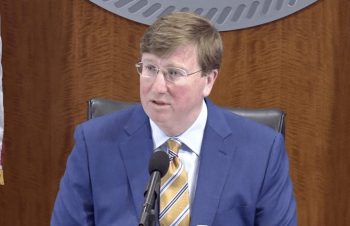
By: Todd “Ike” Kiefer
The current Coronavirus crisis reveals how desperately Mississippi needs universal access to distance learning and telemedicine (DLT). We are a very rural state with a population of only 30 people per square mile outside of our few cities. Our schools, clinics, universities, hospitals, and private practitioners have largely stepped up to be able to deliver these services, but many of our students and patients lack a reliable internet connection at their home that is not critically limited by slow speed, data caps, poor signal, or high cost. To solve this lack of “last-mile connectivity” with fiber-optic cable to the home requires approximately $100 million per county. For this reason and others, it is not going to reach many in our state for years. However, a fixed wireless network designed to deliver threshold broadband capability of 25 megabits per second of download speed sufficient for DLT throughout an entire county can be built for about $1 million. Such a modest price is possible if it can make use of existing elevated water tanks and radio towers and power poles belonging to water associations, volunteer fire departments, and electric power associations. For $100 million, Mississippi could bootstrap its 82 counties to universal broadband access in about a year, if we use the cooperative model to organize ourselves and choose a wireless solution. Can we even imagine the benefits for education, health, economic development, and disaster mitigation of Mississippi being the first state in the nation to achieve such a milestone? So where do we get $100 million?
In this time of fear and tragedy, Mississippi has been given an opportunity to transform itself, but only if we can rapidly find enough unity of vision and will to make strategic use of a once-in-a-lifetime windfall. Buried in the Coronavirus Aid, Relief, and Economic Security Act (CARESact) is $16.5 billion in emergency education funds for measures to continue schooling of children during the COVID19 quarantine. Mississippi’s share of this money is $200 million, of which $30 million is accessible to the Governor as the Governor’s Emergency Education Relief (GEER) Fund, and $170 million to the State Superintendent of Education as the Elementary and Secondary School Emergency Relief (ESSER) Fund. To get the ESSER Funds, the State Superintendent must send a request memo to the U.S. Secretary of Education, along with a plan for spending and accountability, no later than 1 July or it is lost forever. Once requested, the money is transferred to the state education fund in three business days for immediate use. But there is a catch: the bulk of the money cannot be spent by the Mississippi Department of Education itself, but is required, by language Congress put into the CARESact, to be spent by local education agencies—i.e., school districts. This is a great idea from the perspective of making sure the money gets to the front lines, but also makes it challenging to make coordinated use of the funds for a strategic purpose.
It would be most helpful if Superintendent Wright would quickly convene a team of stakeholder representatives from rural education, rural healthcare, electric power associations, rural water associations, and existing internet service providers to help her craft a spending plan that allocates $100 million of the ESSER fund for creating of a statewide broadband network for DLT. Note that this still lives another $100 million in federal emergency education funds on the table for other uses. The core of this plan would be to allocate $1 million equally to each of the 82 counties to be apportioned among its school districts on the basis of their student count. Per the spending plan, this money can only be used to purchase connectivity hardware compatible with a new DLT statewide network. The $18 million balance of the $100 million in the plan would be used to create and equip a statewide DLT cooperative organization to build, operate, and own this network. This public, board-governed, non-profit organization will select the hardware, negotiate bulk pricing for purchase, contract for installation and maintenance, and run the customer service and billing systems. Each school district would become a member and participate by prioritizing the geographic locations within its county for each of the radio tower sites to serve its students and teachers. With the hardware costs fully covered by federal funds, the operations and maintenance costs required to sustain the network would allow modest pricing of $25 per month for a 25 Mpbs residential connection. Existing internet service providers could participate in this network by offering equivalent service and pricing using their own existing infrastructure, or being contracted to operate portions of the new network.
These cost figures and more detailed planning in support of them are available because this plan has been in work for over a year, lacking only a source of funding. North Lauderdale Water Association in Lauderdale County has been pioneering the technological and legal aspects of providing broadband as a non-profit, and is prepared to be a founding member of statewide DLT cooperative we have tentatively named Speed Up Mississippi. We believe if MDE and the school districts will choose to pool this portion of their federal windfall and cooperate with water and power associations, volunteer fire departments, and rural health clinics, we can have significant parts of this network live before school begins in the fall.
We need political champions for this cause, and request that the Governor, Lieutenant Governor, and Superintendent of Education align behind this grassroots initiative. We are also looking for support from incumbent telecommunications providers. This network is designed to be an interim solution sufficient for DLT, but not of such capacity to competing with better solutions to come including fiber and 5G. It is intended to reach the unserved and underserved for perhaps a window of 3 to 5 years, and will have language in its by-laws and articles of incorporation that its customers are under no contract and may switch to superior service offered by another party at any time. Since Speed Up Mississippi would not be intended to make a profit or to be a permanent internet service provider, all concerned would welcome the day when it is put out of business because fiber or 5G has been provided to every home.
The author, Todd “Ike” Kiefer, is a Navy Captain who joined the management team of East Mississippi Electric Power Association and the board of North Lauderdale Water association upon his retirement in 2013. He has a physics degree from the U.S. Naval Academy, a master’s degree in Strategy from the Army Command and General Staff College, 3 years of Pentagon experience on the Joint Staff, 7 combat deployments, and has been active in government relations, economic development, and researching solutions for rural broadband since 2014. He, his wife of 30 years, and their 3 adult children have called Meridian and Mississippi home since arriving just before Hurricane Katrina in 2005.










